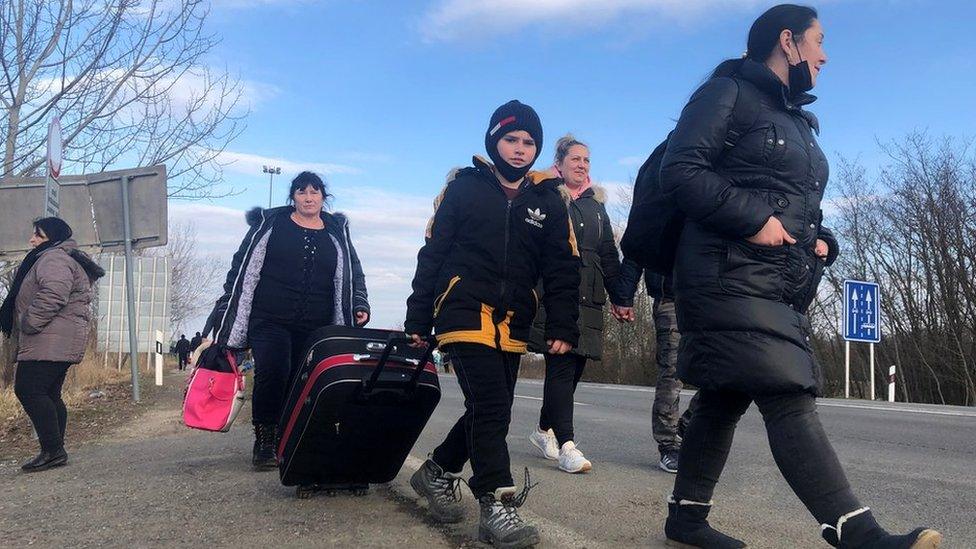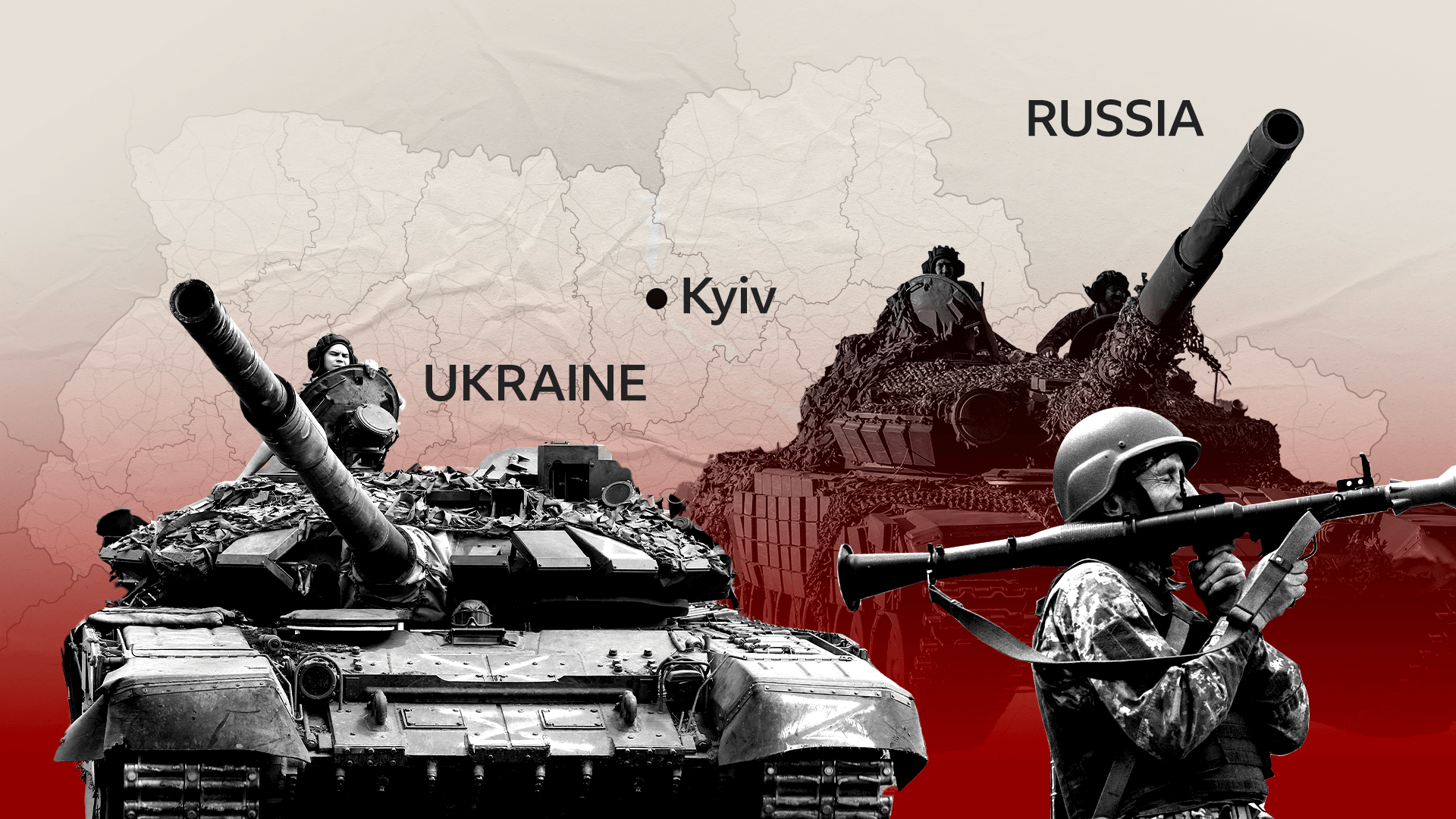Ukraine's Zelensky asks citizens to resist and Europe to do more
- Published
- comments
Watch: Warning shots are fired to disperse crowds trying to flee at Kyiv train station
A defiant Ukrainian President Volodymyr Zelensky has urged European countries to do more to help as he urged his citizens to halt Russia's invasion.
The second day of fighting saw tanks enter the capital, Kyiv, for the first time.
Ukrainian officials said they have handed out 18,000 guns to volunteers, as well as issuing instructions on how to make petrol bombs.
Analysts suggest Russia's advance has been slowed by fierce resistance.
A senior US official told Reuters news agency that Russia had encountered more resistance than anticipated, robbing the Russian force of momentum.
Volunteers with no combat experience have been seen queueing to join the Ukrainian defence, while age restrictions for joining the army have been dropped.
The UK's Chief of Defence Intelligence, Sir Jim Hockenhull, said that Russian forces continue to advance towards the capital - but that Ukrainian Armed Forces "continue to offer strong resistance, focusing on the defence of key cities".
Russia is continuing its assault from the north, south and east.
In the evening, Kyiv came under fresh missile strikes, with explosions reported near a power plant and the sound of gunfire in the city
Loud explosions have been reported in the second-largest city, Kharkiv in the north-east, with Ukrainians saying they have stalled a Russian advance
Mariupol, a strategically important port city on the Sea of Azov to the south, is reportedly under attack
A group of 13 soldiers on Zmiinyi (Snake) island are being honoured as heroes after they died refusing to surrender to a Russian warship
Ukraine says at least 137 people - civilians and soldiers - have been killed, while Russia has not admitted any deaths on its side
More than 100,000 people are estimated to have fled their homes, heading to family or fleeing for the border.
The US, UK and EU have all levied financial punishment on Moscow, but stopped short of removing Russia from the international banking system, Swift.
However, Mr Zelensky said Western nations - and nearby Europe in particular - must go further and "act without delay".
"Europe has enough strength to stop this aggression," he said.
"The columns of tanks and the air strikes are very similar to what Europe saw a long time ago, during WW2 - something about which it said 'never again'," he said. "But here it is, again. Now, in 2022. 75 years after World War Two ended."
He said all counter-measures must be considered - including throwing Russia out of Swift, imposing visa bans and closing airspace to Russia.
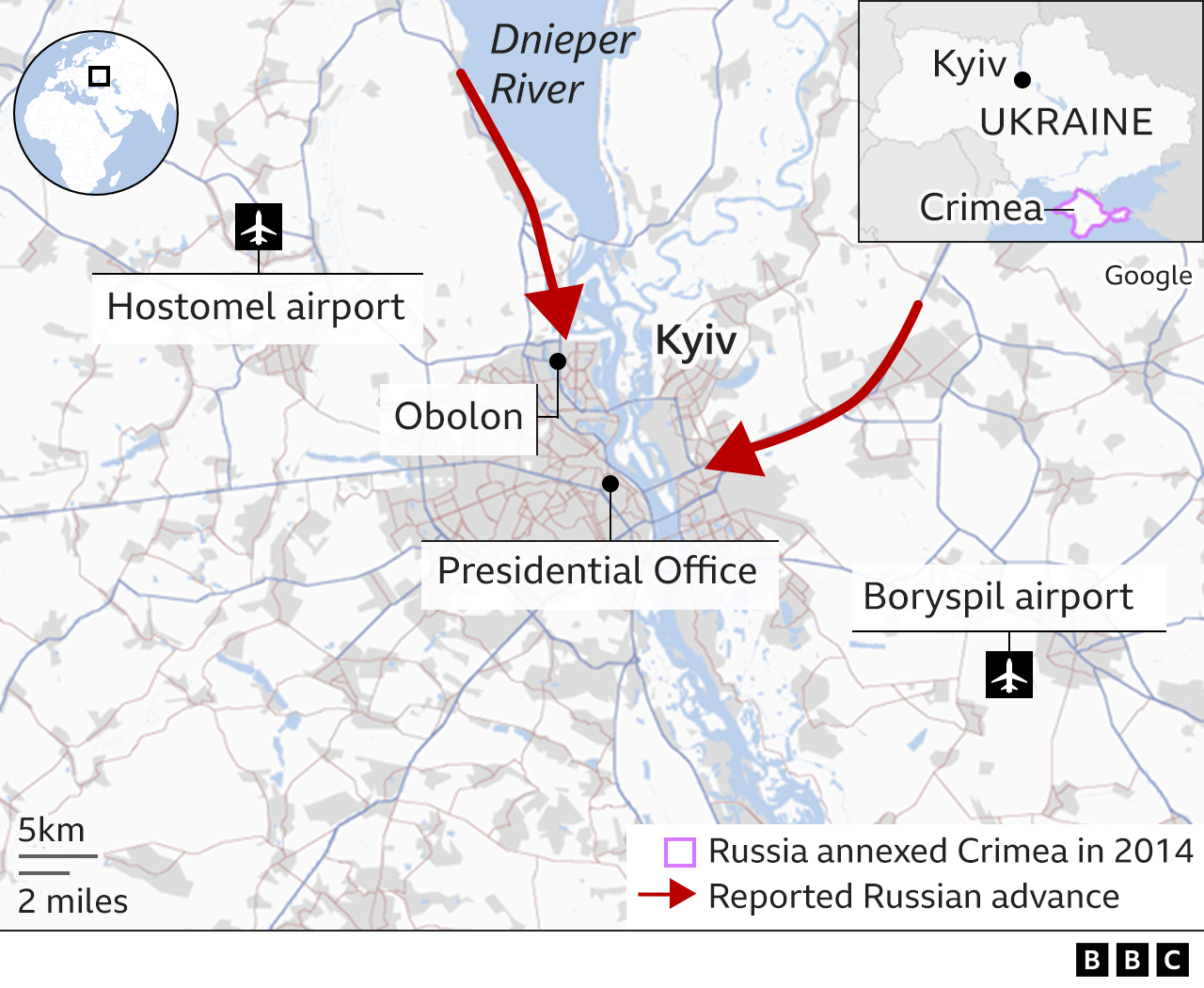
The Ukrainian president's appeal came as Russia offered talks with Ukraine for the first time since the crisis began, but under restrictive conditions. Mr Zelensky has been seeking talks with Vladimir Putin since before the invasion began.
Kremlin spokesman Dmitry Peskov said Russia was prepared for talks with Ukraine, but only in the context of "demilitarisation" and about Ukraine's "neutral status".
Russia has said that Ukraine can never be allowed to join the Nato military alliance, a long-held ambition of Ukraine's.
Russia's Foreign Minister, Sergei Lavrov, said earlier that no talks could take place until Ukraine's military laid down its arms.
But President Zelensky has given no indication that he would accept talks under those conditions.
Addressing the armed forces, Mr Zelensky said: "Stand strong. You are all that we have. You are all that is protecting our state."
Nato Secretary General Jens Stoltenberg, meanwhile, said the alliance would continue to supply weapons to Ukraine and would is deploying thousands of troops to Europe to shore up defences of member nations.
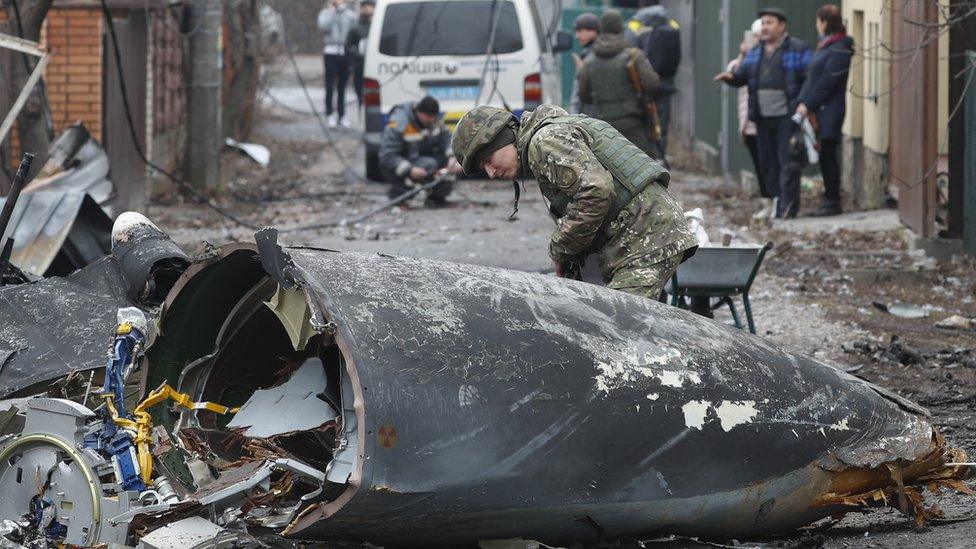
A solider inspects the remains of a plane shot down over the Ukrainian capital, Kiev
Vladimir Putin responded with his own speech, suggesting that Ukrainian forces should turn against and overthrow Mr Zelensky's government.
Repeating an often-used baseless allegation that Mr Zelensky - a Jewish man - is a "neo-Nazi", Mr Putin also labelled the Ukrainian leadership as terrorists and drug dealers.
He accused Ukraine of installing missiles and other heavy weaponry in civilian buildings, using residents as human shields, which he said was based on advice from foreign - particularly US - advisers.
But global human rights group Amnesty International said it was Russia, not Ukraine, that was showing "a blatant disregard for civilian lives".
The charity said, external that Mr Putin's claim of precise strikes on military targets was false, and Russia was "using ballistic missiles and other explosive weapons with wide area effects in densely populated areas".
Strikes have hit hospitals, among other targets that Amnesty said "can constitute war crimes".

Fleeing the Ukrainian capital
Nick Beake, BBC News, Kyiv
As we head out on to the streets of Kyiv, we find men in trainers and jeans with rifles slung across their backs - manning checkpoints, or hidden in the trees on the side of the road behind anti-tank weapons.
As we push on further, we find professional soldiers braced for a last stand. They are accompanied by Ukrainian artillery and tanks facing the Russian position, less than 30km (19 miles) from the heart of the capital.
And we soon find signs of the battle drawing even nearer with a truck ablaze in the middle of the road.
Around the corner, my colleague Abdujalil Abdurasulov and I find Olena's family, a group of five.
They've got a flat tyre at the worst possible time. They frantically try to change it as they bundle a baby into the back seat.
"We're really afraid", Olena's mother tells us, before another loud bang silences everyone.
The BBC’s Nick Beake and his team met one family trying to flee the capital
As I ask her what she thinks of President Putin's attack on her country, an even louder blast pierces the air. She lifts her arms up and says: "You hear that, that was him."
As we drive on, we spot soldiers lined along wide ridges crossing the river Dnipro. Some Ukrainian snipers are lying on their fronts, looking down their sights.
We see the faces of young men, understandably anxious. There is an undoubted fear it could be just a matter of hours before the Russians confront them face to face and try to seize their capital.

Tens of thousands are believed to have fled from the major cities. The United Nations refugee agency estimated on Thursday that more than 100,000 people had left their homes, and up to five million could be displaced by the invasion over time.
European nations are preparing for an influx of refugees, and a steady stream of people - mainly families - have arrived by car and on foot at the borders of neighbouring EU members Poland and Hungary.
The UN's refugee commissioner, Filippo Grandi, said more than 50,000 had left the country in the previous 48 hours - most to Poland and Moldova.
The European Union agreed to freeze personal assets belonging to Mr Putin and Mr Lavrov - though it is not clear if either have significant assets inside the EU. The UK said it would also put personal sanctions on both men "imminently", but did not provide details.
Later in the day, the United States also said it would take similar action against both men. White House Press Secretary Jen Psaki said that precise details would come later, but that a travel ban blocking entry to the US would be a standard part of such sanctions.
Russia has also been banned from cultural and sporting events as a result of the invasion.
It was excluded from the 2022 Eurovision Song Contest, with organisers saying Russia's presence could being the competition into disrepute.
The Formula 1 motor race in Sochi, Russia in September has now been cancelled, and Paris will host the European football Champions League final, not St Petersburg.
- Published24 February 2022
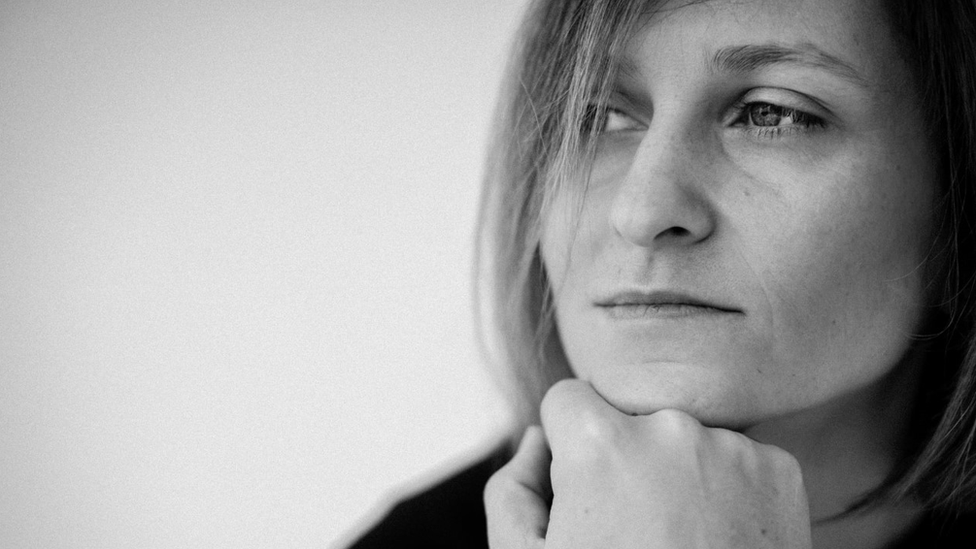
- Published24 February 2022
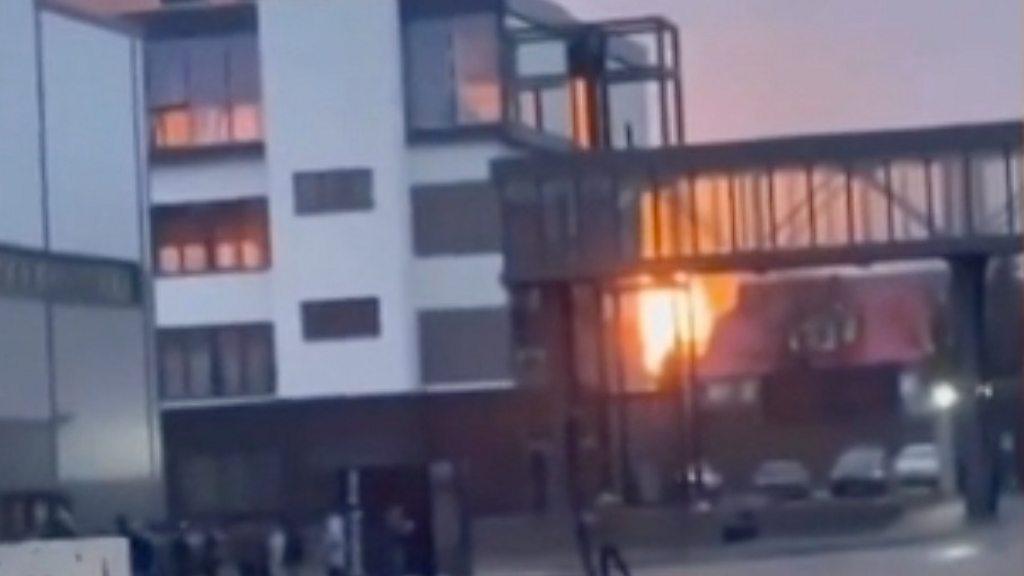
- Published24 February 2023
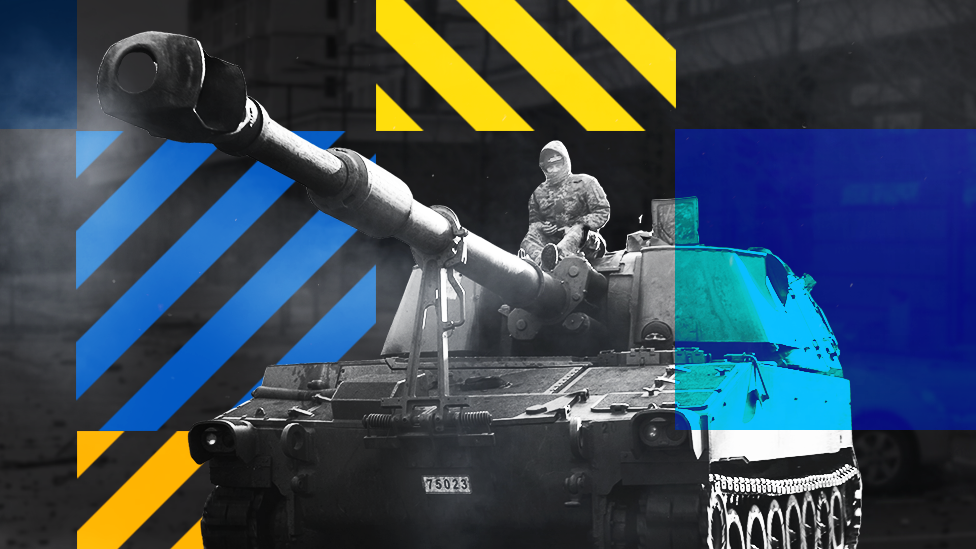
- Published24 February 2022
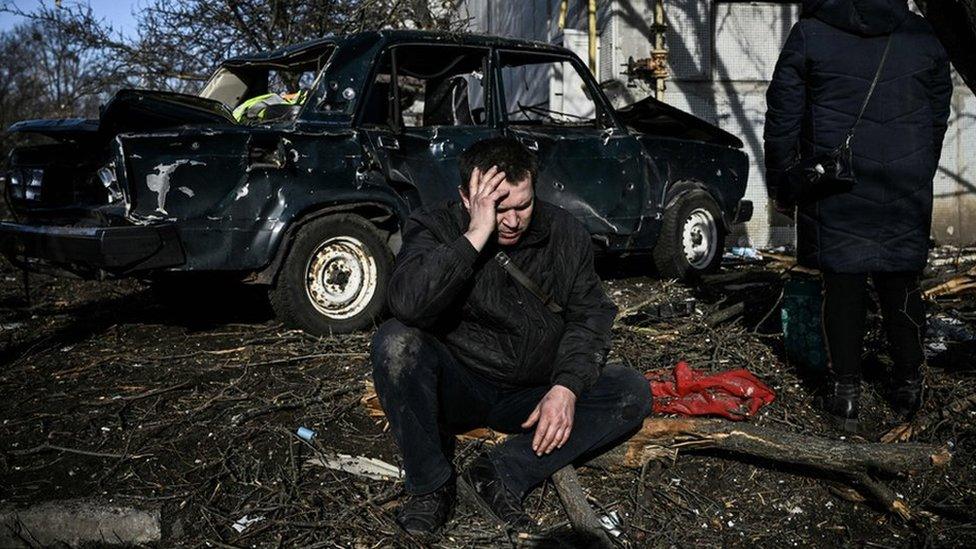
- Published25 February 2022
